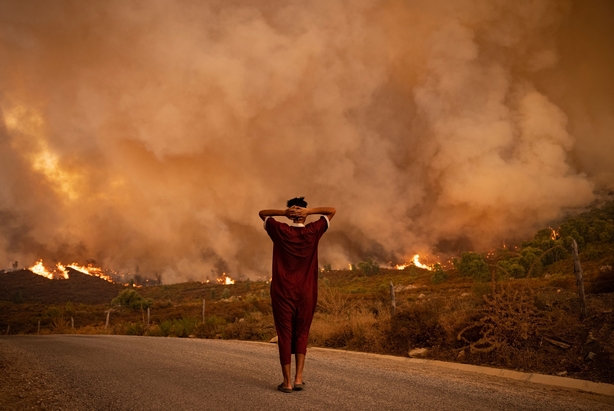The climate is "breaking down", according to a warning from UN Secretary General Antonio Guterres.
"Our planet has just endured a season of simmering - the hottest summer on record. Climate breakdown has begun," Mr Guterres said.
His comments followed the release of new data by the World Meteorological Organization, showing that Earth had experienced the hottest three-month period on record, with unprecedented sea surface temperatures and much extreme weather.
"The dog days of summer are not just barking, they are biting," Mr Guterres said.
It was the hottest August on record by a large margin, according to the report and the second hottest month ever, after July.

which increase the risk of fires
Mr Guterres reiterated his now frequent and increasingly desperate appeal to governments to cut the use of fossil fuels, saying surging temperatures deserve a surge in action.
It comes just two weeks before world leaders are due to gather in New York for a climate summit, as part of the UN's annual high-level week.
Mr Guterres called on them to turn up the heat for climate solutions.
2023 is likely to be the hottest year in human history, the EU climate monitor said.
"Looking at the additional heat we have in the surface ocean, the probability is that 2023 will end up being the warmest year on record," Samantha Burgess, deputy director of the Copernicus Climate Change Service, said.
Last month was the hottest August on record globally, the third straight month in a row to set such a record following the hottest ever June and July, the EU climate monitor added.
August is estimated to have been around 1.5 degrees Celsius hotter than the pre-industrial average for the 1850-1900 period.
Pursuing efforts to limit the global temperature increase to 1.5 degrees Celsius is a central pledge of the Paris international climate change agreement adopted by 196 countries in 2015.
July 2023 remains the hottest month ever recorded, while August's record makes the northern hemisphere's summer the hottest since records began in 1940.
"Global temperature records continue to tumble in 2023," Ms Burgess said.
"The scientific evidence is overwhelming, we will continue to see more climate records and more intense and frequent extreme weather events impacting society and ecosystems, until we stop emitting greenhouse gases."
Read more:
Climate change worsening heatwaves, air quality - UN
How rising temperatures will affect future health
2023: Weather extremes and smashed records
In Europe, August was wetter than normal last month overlarge parts of central Europe and Scandinavia leading to flooding, while France, Greece, Italy and Portugal saw droughts that led to wildfires.
Well-above average temperatures also occurred over Australia, several South American countries and around much of Antarctica in August, the institute said.
Meanwhile, the global ocean saw the warmest daily surface temperature on record, and had its warmest month overall.
With four months left in 2023, this year is so far the second-hottest on record, only marginally behind 2016.








